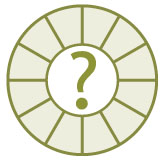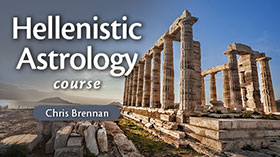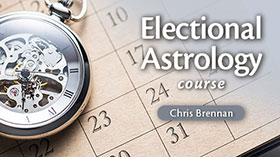House System Poll & Rectification Research Project
 The Academy of Astrology and The Tradition journal recently announced two new research projects that they are working on in order to conduct studies within the astrological community.
The Academy of Astrology and The Tradition journal recently announced two new research projects that they are working on in order to conduct studies within the astrological community.
The first project is an online house system poll in order to get an idea of what system of house division different types of astrologers use. The poll asks each astrologer several specific questions such as which system of house division they use, why they use it, how they came to use it, how they classify their astrological practice (i.e. modern, traditional), etc.
Here is a video that the group produced in order to explain a little bit about the poll:
The idea of the poll is rather exciting, and I’m interested to see what the results look like. It will be especially interesting to see what happens if the poll is conducted again 5 or 10 years down the road, and how things change between now and then given some of the shifts that are occurring in the astrological community at the present time. The poll only takes a minute or so to complete, so if you have a chance then please stop by their website and take it.
Rectification Research Project
The same group is also conducting a separate study called the Antimodar Project, which involves studying a specific Medieval technique that was used in order to rectify birth charts. They are requesting that people submit timed birth data to the project in order to run it through a program that they designed in order to determine how well the technique works. Here is a short video that they produced which explains the scope of the project:
If you have an accurate birth time then please stop by the Antimodar Project page on their site and submit your birth data when you get a chance.
My Thoughts on the House System Poll
Some early results are already in on the house system poll, and the division amongst traditional astrologers seems to fall largely along three different party lines.
I was asked to respond to a few questions based on the preliminary results for a short piece that the group is publishing in the upcoming issue of the Tradition journal, and I ended up writing what almost amounts to a short essay on the subject.
I thought that I would publish my full response here since it will probably have to be edited down quite a bit in the journal. Here are the questions that were asked in the survey followed by my answers:
Generally, in Hellenistic astrology Whole Sign houses are favoured; in Medieval, Alchabitius Semi-arc; in Traditional, Regiomontanus houses are used. It seems that this is largely for historical reasons – one follows the house system associated with the astrological period one studies.
In your opinion:
Do you think that the above is true?
I would agree with this statement, since I think that at this point in time most practitioners of traditional astrology tend to follow the house system associated with whatever historical tradition they are the most focused on, although I think that part of this is due to the fact that there have been different stages in the revival of ‘traditional’ (i.e. pre-19th century) astrology, and there is a sort of division amongst practitioners along these lines. I don’t think that this will always be the case though, since the revival of traditional astrology is still in its infancy to some extent, or perhaps in its adolescence.
The current division amongst traditional astrologers on the subject of house division can best be explained by the three different schools or starting points in the revival of traditional astrology over the past three decades.
For example, there is a large contingent of traditional astrologers who came out of the Lilly movement that started in the UK in the 1980’s, and this would be the group that would be more prone towards using Regiomontanus since that is what Lilly used.
There is another large contingent of late Medieval astrologers who were largely influenced by the work of Robert Zoller, which also started in the 80’s, and this is the group that would be more prone towards using Alchabitius since that is what Zoller advocated based on Bonatti.
The more recent group would be the Hellenistic (and some early Medieval) astrologers who are influenced by the work of Robert Schmidt and Robert Hand through Project Hindsight, which started in the mid-90’s, since the use of whole sign houses in the early tradition was seen as one of the major technical discoveries was made during the early course of the project. Astrologers who specialize in Hellenistic astrology tend to use whole sign houses since that is what virtually every astrologer in that tradition used, and Schmidt and Hand became major proponents of the system.
So, what we have at the moment is actually very similar to what happened in the historical transmission of traditional astrology itself, insomuch as people are learning astrology from specific schools or teachers and then continuing to employ and spread the methods and techniques that they learned in their own practice. The fact that traditional astrology has been recovered in different stages over the past few years has only exacerbated this tendency.
Do you think that there is a definitive house system, if so, which?
As a practitioner of astrology, and as someone who is familiar with the different traditions, I would argue in favor of using whole sign houses as the primary method of house division, although this comes with a few caveats.
In the mid-90’s Schmidt pointed out that there was a distinction in the Hellenistic tradition between whole sign houses which were used for topics, and quadrant houses which were used for determining planetary strength. This is actually a very important argument, and Schmidt was correct in pointing out that the different forms of house division were originally designed in order to study different things in the Hellenistic tradition. However, it appears to me (and probably Schmidt at this point as well) that it is not so much that the Hellenistic astrologers were using whole sign houses in order to assign topics (i.e. health, finances, siblings, parents, etc.) and quadrant houses in order to determine angularity, but rather that in almost every area of chart delineation whole sign houses were used in order to determine both topics and strength (angularity), except in the length of life treatment, which is where the Hellenistic astrologers usually tended to introduce the quadrant systems. This effectively means that unless you are working with the length of life technique, you are using whole sign houses virtually 100% of the time. Unfortunately, this caused quite a bit of confusion in the later Medieval tradition, which is what eventually led to the plethora of different house systems that were introduced.
This has led some to argue that the widespread adoption of the quadrant systems was based on a mistake or a misunderstanding that occurred at some point in the Medieval tradition. While I’m not sure that I would necessarily go that far adopting that sort of an argument, I do think that this sort of a historical narrative goes a long way in attempting to address the issue of house division and providing a more viable rationale for primarily using whole sign houses rather than simply saying “it works for me.”
Of course, I do think whole sign houses work better in practice based on my experience with the different systems, as I’m sure advocates of other forms of house division do as well, however I think that I have a bit of an advantage in making this argument because whole sign houses actually provide a stark contrast with some of the other forms of quadrant houses which only show small variations when compared with one another, and especially because the use of whole sign houses clears up some of the nagging technical problems with the system that have been somewhat problematic over the past 1,000 years or so. For example, the issue of intercepted houses and house systems that break down in extreme latitudes, which never seems to have been sufficiently addressed at this point, completely disappears in whole sign houses. This also leads to other areas of greater continuity in the system, such as in synastry, since the houses of each nativity are perfectly aligned when you compare them using whole sign houses. The transit doctrine also becomes more interesting with whole sign houses, because sign ingresses gain increased importance since the ingress of a planet into a new sign is also an ingress into a new house, and the topics associated with that house begin to become more prominent in the native’s life shortly thereafter. Even the more advanced techniques like annual profections make more sense within a whole sign context, since the profection is seen to count by one sign and house per year.
So, due to the reasons outlined above, I do think that whole sign houses represent something very close to a definitive form of house division. I still try to maintain an open mind about how the quadrant systems may be integrated into this framework, and I think that you even see some of the Hellenistic astrologers such as Vettius Valens doing this as early as the 2nd century, although I would argue that any future synthesis of the two approaches will need to primarily predicated on a whole sign framework, since that was original structure on which our system or tradition of horoscopic astrology was designed in the first place.
Do you think that it matters which house system is employed?
Yes, of course. It is the difference between answering a horary question correctly or incorrectly, judging whether or not an upcoming year will be fruitful or unfruitful, and in some cases it is the difference between life or death (from the standpoint of the delineation of matters of vitality at least).
Do you think that certain house systems favour certain astrological applications?
I think that quadrant houses are primarily useful within the context of the length of life technique, although outside of that I find that whole sign houses provide a more consistent way of approaching almost every technique or application of horoscopic astrology.
Do you think that there were cultural or spiritual bases for ancient house systems, or that it was merely a matter of mathematical perspectives?
I think that the houses may have originally been developed as a result of a synthesis between the Egyptian system of the decans and the Mesopotamian system of the zodiac. Certainly each had certain cultural/spiritual implications as well as mathematical ones one its own, and then the combined system of the twelve houses was infused with its own peculiar mathematic and spiritual/philosophical rationale. In the Hellenistic tradition you have on the one hand the mathematical/geometrical interface between the notion of angularity and configuration of a house to the sign of the ascendant, which led to the doctrine of the good and bad houses, while on the other hand you have the system of joys and some of the deeper spiritual/philosophical notions surrounding the nature of each house and why a planet is said to rejoice there.
What is your preferred system of house division? Why?
Whole sign houses, for the reasons outlined above.
Article tags:



















[…] latest issue of the journal starts off with a short piece related the house division poll that they are currently conducting, with statements from a number of astrologers about which system […]
[…] latest issue of the journal starts off with a short piece related the house division poll that they are currently conducting, with statements from a number of astrologers about which system […]
Dear Chris Brennan,
I love your site and just wished to thank you for everything you are doing!
Especially thank you for this clarification about the “whole sign house system”, which I am going to start using right now, since I was confused and tired after years of using Koch’s, Placidus’ et al.
Thanks again with greetings from Belgrade, Serbia.
Wolfgang
Thanks for the compliments Wolfgang! Glad to hear that you are starting to work with whole sign houses. I expect that you will find the results to be rather compelling.
http://www.skyscript.co.uk/greek_horoscope.html
hi Chris
This finding seems to suggest the use of Porphirius system in atiquity.What do you make of it?
thsnks
Paul, I just posted a long comment on the Skyscript thread on this topic which I think directed you to this article today, so you should take a look at that for my response to your question.
Hi Chris
Given that ancient Astrologers tend to avoid the topic of houses,maybe they simply werent sure.After al, accurate birthtimes were hard to come by.
Even Ptolemy seems to prefer to use planets as significators than houses- sun for love,if I remember well, mercury for siblings etc.
thanks
Ptolemy is really the only Hellenistic astrologer that had a pronounced tendency to avoid the houses. If you look at other authors like Dorotheus and Valens the situation is much different. Also, Valens has over 100 timed example charts in his Anthology, so I’m not sure that it is true that accurate birth times were hard to come by.
and are Valens charts obviously in Whole sign houses?
thaks
Yes, without a doubt.
Hi Chris,
My only issue with whole signs is in the case of twins I know 3 sets of twins from my school both in my year, they have had different types of lives and different character traits…….although some things are similar.
My point is the ascendant moves a degree every 4 minutes, this would allow for example , Mars going from the twelfth house into the first. Thus one twin would be more out going etc. Mars first house and one more reflective, Mars 12th house?
With whole signs the charts could be exactly the same for anybody born with in a two hour time slot unless one twin was born on the cusp??
Cheers Steve
With whole sign houses distinctions can still be made between the degree that the ASC and IC fall in, and thus what terms or twelfth-parts they fall in, as well as whether a planet is above or below the horizon, although you are right that for the most part those placements would still be in the same house. It seems like modern astrologers and advocates of quadrant houses are rarely that precise when looking at house cusps though, as usually a planet within 5 degrees of a cusp is considered to be in the following house.